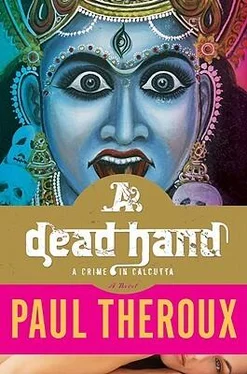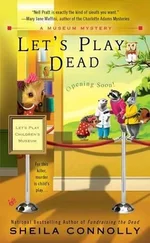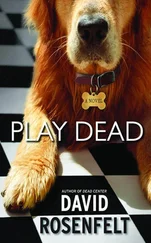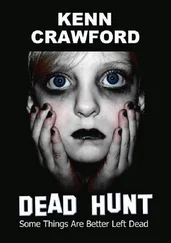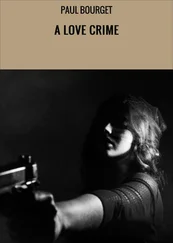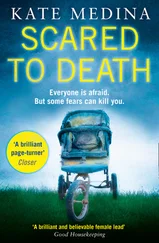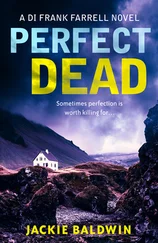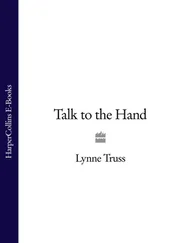"I breaking the rules, sir. He beat me with a lathi, sir. He calling me kangali. Bhikhiri. Other bad names. Then he say, ' Tumi kono kajer na — tumi ekdom bekar! '"
This outpouring of Bengali left me glassy-eyed, and I was stunned into staring at her.
"'You totally useless. Totally worthless.' Then he sack me."
"That's awful."
"Very bad. What I can do? But I knowing why you come to Ananda Hotel. I knowing about your friend."
"That there was a dead body in his room?"
"Dead boy, sir. Rolled in carpet, sir. Like tumbaco in beedee."
"You saw it?"
"When they taking it away, we all knowing. Mr. Bibhuti Biswas say Chup karo. Not say anything! But it is human child, sir. One of God's children."
"What could have happened to him?"
"I cannot know how he dead."
"No. I mean, how did they dispose of him?"
"Disposing in pieces, sir. So horrible. I was witness. They used very sharp dah. "
"I mean, in the carpet?"
"Not carpet afterward. Crate, sir. Steamer trunk, so to say. Maybe in the river. Or in municipal dustcart."
"We'll never find him."
"So many people die in Calcutta, sir."
"Some of them are right here."
In the stillness of the cemetery, behind the thick perimeter walls, among the high monuments and the ornate inscriptions, the fluted columns and the statuary.
"But I am liking to come here."
"For the tombstones?"
"For the angels, sir. See them."
Angels kneeling at prayer, angels on plinths in repose. Angels with their wings spread — some of the wings clipped, other angels beheaded — angels sounding trumpets. They were cracked and battered, some of them carved in stone, others in marble, and in this city of peeling paint most of them were mottled or mossgrown, but they were angels nonetheless. The angels put me in mind of the dead boy in the room.
"But how did he get there?" I asked. Mina was staring at me, her good eye registering concern. "The boy. In the hotel. In the room."
"I duty manager."
"At the desk?"
"Yes. It was a parcel delivery."
I smiled at the explanation, as I had smiled at duty manager. "They delivered a dead body?"
"A carpet, sir. I sign for it, sir. The carpet was dispatched to room of your friend."
"What room?"
"Fifteen. Garden view."
"Where was the body?"
"Carpet was parceled. Body was inside."
Now I saw it: the skinny child rolled in the carpet and brought upstairs, perhaps in the darkness, lugged into the room and unrolled. Rajat had woken and seen it, the corpse on the floor, and had fled.
"So my friend wasn't imagining it?"
"You not tell Mr. Bibhuti Biswas, sir, that you speak to me. He be so angry."
"He's not your boss anymore."
"He be terrible to me again, beating me. He knowing my residence in bustee in Tollygunge. I have new job."
"What doing?"
"Sweeper, sir."
This tore at my heart — the bruised face, the skinny fingers tugging at her shawl. Helpless and ashamed, I gave her two five-hundred-rupee notes.
"God bless you, sir."
She reached into the folds of her shawl and took out a small cloth shoulder bag and set it on her lap. She plucked open the knots on the flap and slid out a plastic pouch that was taped shut.
"Not be fearful, sir, please."
"Why should I be fearful?" I had started to smile, but her bruised face sobered me.
"It be so strange to you. You must not cry out. It is very important. It is all that is left. The only thing." She spoke slowly, annoyingly so. She was nodding as she put the plastic pouch into my hand. "You will be knowing what to do."
"Shall I open it now?"
"After I gone, sir. I can't bear look it again. It is terrible thing indeed."
She flung her shawl around her face, pinched it at her chin so that only her eyes showed, then she bowed, said "Bless you, sir" again, and slipped between the gravestones and the many angels and was gone.
I held the soft pouch. I was skeptical: Indians loved drama; their natural element was hyperbole. They lived in words — words were kinder and more habitable than the bustees. Mrs. Unger was like that too. So I picked at the lightly taped parcel with the feeling that I was being trifled with in the Indian way: It be so strange to you. You must not cry out.
I did not cry out at once. I thought: A piece of meat, how odd in vegetarian India.
But then I saw the small fingers, the tiny fingernails, almost reptilian, the lined palm, the severed wrist bone, the ragged flesh bound by a piece of string. A human hand — a dead hand, stiff and gray. And I let out a cry, as though someone had stabbed me, and twisted the knife.
With this thing in my possession I knew I could not leave Calcutta.
Had I been in a house, I would have hidden the dead hand in a distant room, or in a box in the basement, or in an attic trunk. There was something creepy about carrying this horrible thing back with me to my bedroom in the Hotel Hastings. I kept thinking of the yellow fingernails, the neatly severed wrist tied with string. Wherever I put it in my room, I would never be more than six feet away from it. I could not put it in a drawer or in the closet — the cleaning woman would find it. So I locked it in the side pocket of my duffel bag, using my little padlock. Because the pocket was small I could see where it swelled, could almost make out the contour of the dead knuckles — my eye was constantly drawn to the bulge.
Who was it? Someone who had only worked, who had never laughed, who was forgotten, someone perhaps more useful dead than alive; a sad soul. My memory of the thing woke me in the night. I imagined it flexing to be free, trying to claw out of the side pocket. Even liberated, saved from cremation, it was no more than a stiffened hand, a little paw that had been detached from a body.
Severed, in its discolored plastic bag, it was pathetic, needing attention. I felt a severe sense of obligation. In spite of being so small it imposed a great weight, holding me here in Calcutta, pleading to be identified. It was my secret and my responsibility. I had been entrusted with it. Mina knew how valuable it was, but she could not have known how much it mattered to me — how it reproached me. I wished I had never seen it, because I knew now that it obligated me. I had seen hands like this many times in Calcutta — just like this, stuck into my face as I sat in traffic, or imploring me as I walked around the city, the cupped hand of a beggar.
At my lowest points at night, studying the bulge in my duffel bag, I knew who this sad neglected figure was who'd been bundled up and brought to the room. It was me. I knew whose this dead hand was. It was mine.
Mrs. Unger had said early on that she needed to see me. Now she seemed to be ignoring me. That paradox wounded me, but what could I do about it? Only obey. Ask no questions.
I called Howard at the consulate, hoping that he would help me identify the dead hand, as I assumed Mina wished me to do.
"I need a favor."
"This is why I'm here, to grant favors to itinerant Americans."
"It's serious. I want you to put me in touch with a forensics expert. I have an item that needs examining, in confidence."
"Tell me what you've got and I'll let you know."
"A dead hand." I had said it so softly I had to repeat it three times before he understood.
"Is this a figure of speech?"
"A human hand. Rather small. No joke. I need to know more about it."
When he realized I was serious, he became solemn and a bit chastened. He swallowed hard and said, "You want to see my friend Dr. Mooly Mukherjee at police HQ. I'll call him and tell him you're coming."
The next day, following directions to Bazar Street, near Dalhousie Square, I presented myself at the main police station and, after a long wait, was brought upstairs by a chowkidar to meet Dr. Mooly Mukherjee. He was big-bellied with a full mustache and the brisk, confident manner of a medical man.
Читать дальше
